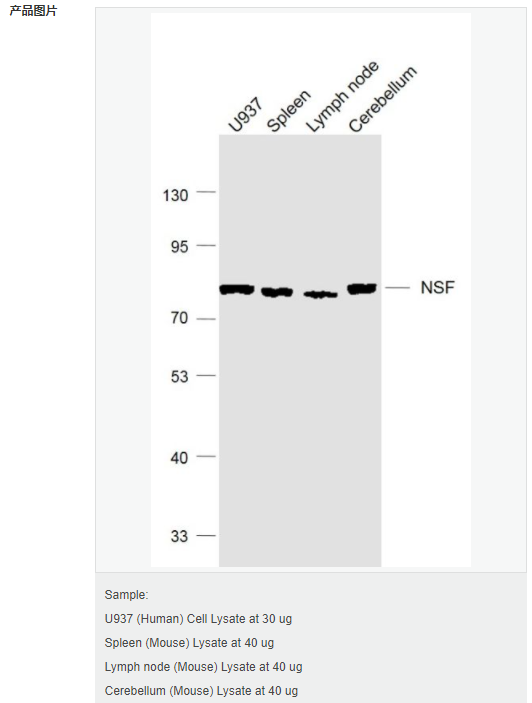

貨號
產(chǎn)品規(guī)格
售價
備注
BN40293R-100ul
100ul
¥2360.00
交叉反應(yīng):Human,Mouse,Rat(predicted:Dog,Pig,Cow,Horse,Rabbit,Zebrafish,Sheep) 推薦應(yīng)用:WB,IHC-P,IHC-F,ICC,IF,ELISA
BN40293R-200ul
200ul
¥3490.00
交叉反應(yīng):Human,Mouse,Rat(predicted:Dog,Pig,Cow,Horse,Rabbit,Zebrafish,Sheep) 推薦應(yīng)用:WB,IHC-P,IHC-F,ICC,IF,ELISA
產(chǎn)品描述
| 英文名稱 | NSF |
| 中文名稱 | N-乙基順丁烯二酰亞胺敏感融合蛋白抗體 |
| 別 名 | N ethylmaleimide sensitive factor; N ethylmaleimide sensitive factor; N ethylmaleimide sensitive factor like protein; N ethylmaleimide sensitive fusion protein; N ethylmaleimide sensitive fusion protein; N-ethylmaleimide-sensitive fusion protein; NEM sensitive fusion protein; NEM sensitive fusion protein; NEM-sensitive fusion protein; NSF; NSF_HUMAN; SKD 2; SKD2; SKD2; Vesicle fusing ATPase; Vesicle fusing ATPase; Vesicle-fusing ATPase; Vesicular fusion protein NSF; Vesicular fusion protein NSF; Vesicular-fusion protein NSF. |
| 研究領(lǐng)域 | 腫瘤 神經(jīng)生物學 信號轉(zhuǎn)導 |
| 抗體來源 | Rabbit |
| 克隆類型 | Polyclonal |
| 交叉反應(yīng) | (predicted: Human, Mouse, Rat, Dog, Pig, Cow, Horse, Rabbit, Zebrafish, Sheep, ) |
| 產(chǎn)品應(yīng)用 | WB=1:500-2000 ELISA=1:5000-10000 IHC-P=1:100-500 IHC-F=1:100-500 ICC=1:100-500 IF=1:100-500 (石蠟切片需做抗原修復(fù)) not yet tested in other applications. optimal dilutions/concentrations should be determined by the end user. |
| 分 子 量 | 83kDa |
| 細胞定位 | 細胞漿 |
| 性 狀 | Liquid |
| 濃 度 | 1mg/ml |
| 免 疫 原 | KLH conjugated synthetic peptide derived from human NSF:151-250/744 |
| 亞 型 | IgG |
| 純化方法 | affinity purified by Protein A |
| 儲 存 液 | 0.01M TBS(pH7.4) with 1% BSA, 0.03% Proclin300 and 50% Glycerol. |
| 保存條件 | Shipped at 4℃. Store at -20 °C for one year. Avoid repeated freeze/thaw cycles. |
| PubMed | PubMed |
| 產(chǎn)品介紹 | Several protein-protein interactions are essential to membrane fusion during endocytosis. Membrane fusion requires interaction among SNARE1 proteins associated with both donor and acceptor membranes (1,2). Following membrane fusion, the α-SNAP cytoplasmic adapter protein binds to the SNARE complex. N-ethylmaleimide-sensitive factor (NSF), a hexameric ATPase, then associates with the α-SNAP/SNARE complex to mediate SNARE disassembly during membrane fusion (3,4). The ATPase activity of NSF induces a conformational change in the α-SNAP/SNARE complex that leads to its dissociation from the membrane, membrane fusion and eventual recycling of the SNARE complex for subsequent membrane fusion (3,4). Function: Required for vesicle-mediated transport. Catalyzes the fusion of transport vesicles within the Golgi cisternae. Is also required for transport from the endoplasmic reticulum to the Golgi stack. Seem to function as a fusion protein required for the delivery of cargo proteins to all compartments of the Golgi stack independent of vesicle origin. Subunit: Homohexamer. Interacts with GABARAP and GABARAPL2. Interacts with GRIA2. Interacts with PLK2, leading to disrupt the interaction with GRIA2. Interacts with MUSK; may regulate MUSK endocytosis and activity (By similarity). Interacts with CDK16 (By similarity). Subcellular Location: Cytoplasm. Post-translational modifications: Phosphorylation at Ser-569 interferes with homohexamerization (By similarity). Similarity: Belongs to the AAA ATPase family. SWISS: P46459 Gene ID: 4905 Database links: Entrez Gene: 4905 Human Entrez Gene: 18195 Mouse Omim: 601633 Human SwissProt: P46459 Human SwissProt: P46460 Mouse Unigene: 431279 Human Unigene: 260117 Mouse Unigene: 13345 Rat Important Note: This product as supplied is intended for research use only, not for use in human, therapeutic or diagnostic applications. |
